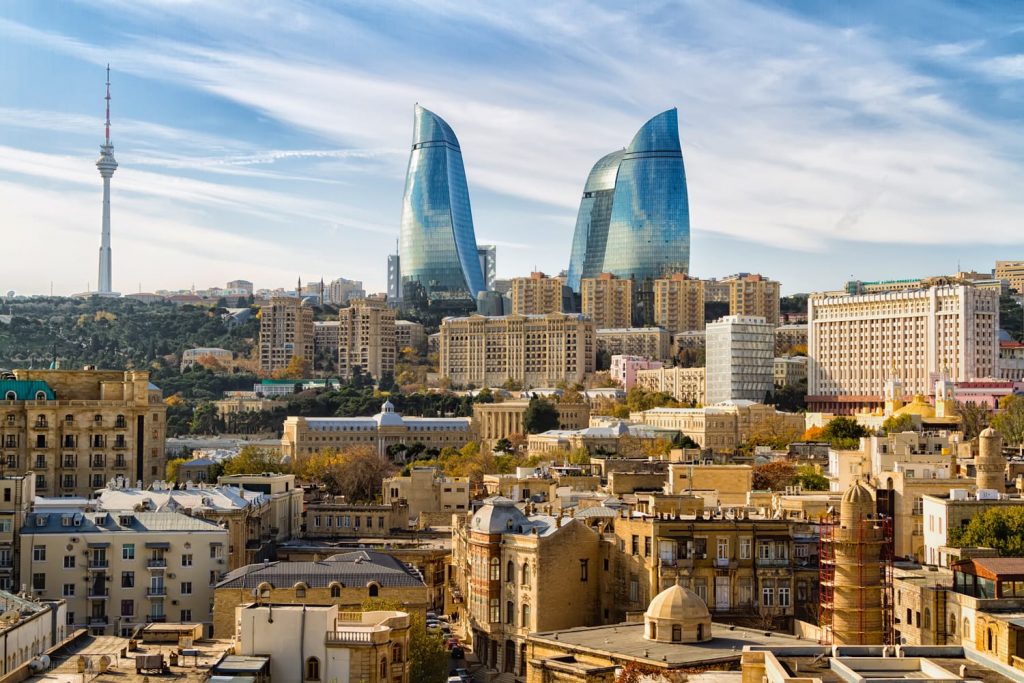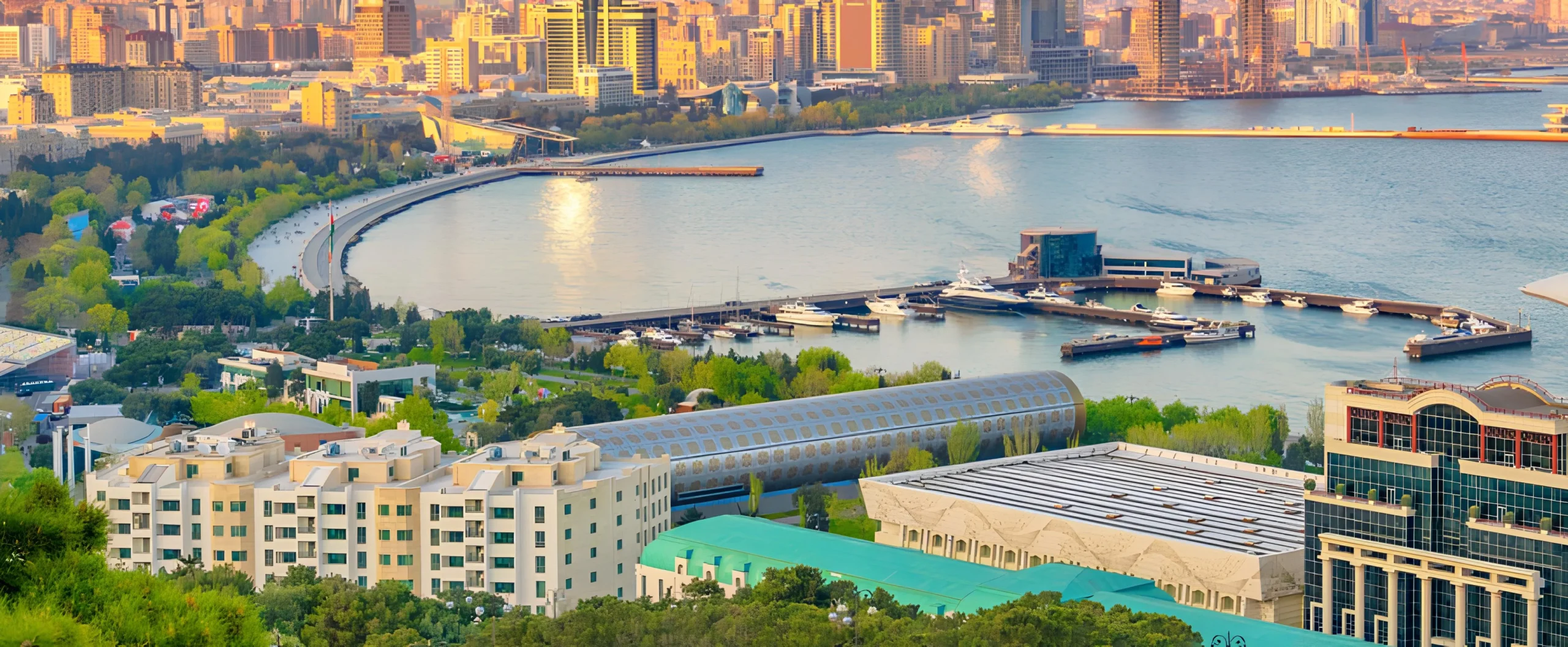Azerbaijan: A Crossroads of Culture and Opportunity
A suitable business location, situated at the intersection of Eastern Europe and Western Asia, Azerbaijan is a vibrant nation celebrated for its rich cultural heritage, historical significance, and abundant natural resources. Dubbed the “Land of Fire,” the country blends tradition with modernity, epitomized by the dynamic skyline of its capital, Baku. Positioned along the Caspian Sea and endowed with vast oil and natural gas reserves, Azerbaijan has built a robust economy and established itself as a pivotal player in global markets. As a member of the Commonwealth of Independent States (CIS), Azerbaijan continues to strengthen its global economic and cultural ties.
Living Standards in Azerbaijan
Over the past few decades, Azerbaijan has significantly improved its standard of living through economic reforms and investments fueled by oil and gas revenues.
- Income Distribution: While urban centers such as Baku enjoy higher income levels, economic disparities persist in rural areas, where development is ongoing.
- Healthcare Services: Public healthcare is widely accessible, though many opt for private healthcare facilities, which offer superior quality and efficiency.
- Education System: Education is free and compulsory up to secondary levels. Higher education opportunities are expanding, with government initiatives supporting professional and academic growth.
- Housing Costs: Housing in Azerbaijan varies by location, with affordable options in rural areas and higher prices in urban hubs like Baku.
Personal Taxation in Azerbaijan
Azerbaijan’s income tax system is progressive and attractive for residents and expatriates alike.
- Income Tax Structure:
- Income up to AZN 2,500 per month: taxed at 14%.
- Income exceeding AZN 2,500 per month: taxed at 25% on the amount above the threshold, with an additional flat tax of AZN 350.
- Social Security Contributions:
- Employees contribute 3% of their salaries.
- Employers contribute 22% of an employee’s gross income.
This taxation framework, coupled with Azerbaijan’s moderate cost of living, creates a favorable environment for workers and businesses.
Corporate Taxation in Azerbaijan
Azerbaijan’s corporate tax system is designed to attract foreign investment while fostering domestic business growth.
- Corporate Tax Rate: Businesses are subject to a flat corporate income tax rate of 20%, which is competitive within the region.
- Value-Added Tax (VAT): A standard VAT rate of 18% applies to most goods and services, with exemptions for essential items.
- Special Economic Zones: Businesses operating in designated zones benefit from reduced corporate taxes and exemptions from import duties, promoting industrial and technological development.
- Withholding Taxes: Payments made to non-residents, such as dividends, interest, and royalties, are subject to a 10% withholding tax, often reduced under Azerbaijan’s double taxation agreements.
Key Industries Driving Azerbaijan’s Economy
Azerbaijan’s economy is diverse yet significantly shaped by its wealth of natural resources.
- Oil and Gas Sector:
The backbone of Azerbaijan’s economy, the oil and gas sector is powered by extensive reserves in the Caspian Sea. The State Oil Company of Azerbaijan Republic (SOCAR) oversees much of the production, attracting global energy partnerships. - Agriculture:
Agriculture remains a critical sector, employing a significant portion of the population. Key products include cotton, grains, tea, fruits, and vegetables. Government-led rural development initiatives aim to modernize the sector and enhance productivity. - Tourism:
Azerbaijan’s unique mix of ancient history, natural beauty, and modern urbanity makes it an emerging tourist destination. Baku’s architectural marvels, the Caspian coastline, and the Caucasus Mountains are major draws for visitors. - Manufacturing:
Steady growth in manufacturing has diversified the economy. Key products include textiles, food items, machinery, and chemicals, with emerging investments in electronics and automotive industries. - Technology and Innovation:
Azerbaijan’s commitment to fostering a startup ecosystem and technology parks signals its ambitions for digital transformation and innovation-led growth.
Inflation and Living Costs in Azerbaijan
Azerbaijan maintains relative economic stability, though inflation rates can fluctuate due to global oil prices and currency dynamics. Recent government efforts aim to reduce inflationary pressures.
- Housing Costs: Renting a one-bedroom apartment in central Baku costs between $300 and $700 per month, with significantly lower rates in rural areas.
- Groceries and Dining: Locally produced food is affordable, but imported goods command higher prices. Dining at mid-range restaurants typically costs $10–$20 per person.
- Utilities and Transportation: Monthly utility bills range from $50 to $100, while public transportation is efficient and inexpensive, with a single ride costing around $0.20.
Taxation on Property, Services, and Sales
Azerbaijan’s tax system supports both individual and business compliance through well-defined regulations.
- Property Tax:
Property owners pay an annual tax based on the property’s value and intended use. Residential properties are taxed at lower rates than commercial ones. - Value-Added Tax (VAT):
The VAT rate is 18%, applicable to most goods and services, with reduced rates or exemptions for essentials like healthcare and food items. - Excise Taxes:
Levied on goods such as alcohol, tobacco, and fuel, these taxes are intended to regulate consumption while generating revenue. - Service Taxes:
Businesses providing services in sectors like telecommunications and hospitality are subject to VAT and additional levies, depending on the service type.
Business Structures Available in Azerbaijan
Entrepreneurs in Azerbaijan can select from various business entities based on their operational needs:
- Limited Liability Company (LLC):
- Ideal for small and medium-sized enterprises.
- Requires a minimum capital of AZN 10.
- Liability is limited to the capital contributed.
- Joint-Stock Company (JSC):
- Suitable for larger businesses and public companies.
- Can be open (publicly traded shares) or closed (privately held shares).
- Branch or Representative Office:
- Allows foreign companies to operate in Azerbaijan without creating a separate legal entity.
- Primarily used for market research or representation.
- Sole Proprietorship:
- Best for individuals running small-scale businesses.
- Easy to establish but carries unlimited personal liability.
Azerbaijan, with its strategic location, resource wealth, and growing industries, offers a unique blend of opportunities for investors and entrepreneurs. Its stable taxation system, improving infrastructure, and commitment to economic diversification make it a promising destination for business and lifestyle.
Licenses Required to Establish a Business in Azerbaijan
Starting a business in Azerbaijan involves securing the necessary licenses and permits to ensure compliance with local regulations. The process is streamlined and straightforward, with many steps available online. Key requirements include:
- Business Registration:
Entrepreneurs must register their business with the Ministry of Taxes to obtain a Taxpayer Identification Number (TIN). This process typically takes three to five working days. - Sector-Specific Permits:
Industries such as healthcare, construction, and finance require additional approvals from relevant regulatory bodies. - Social Security Registration:
Businesses must register employees with the State Social Protection Fund to comply with labor and social security laws. - Environmental Approvals:
Companies operating in sectors like manufacturing or construction may need to conduct environmental impact assessments and secure relevant permits.
Business Opportunities for Expats in Azerbaijan
Azerbaijan’s growing economy and strategic geographic location provide numerous opportunities for expatriates to establish and expand their businesses. Promising sectors include:
- Energy and Infrastructure:
Azerbaijan’s expanding energy market offers lucrative opportunities in oil services, renewable energy projects, and infrastructure development. - Tourism and Hospitality:
With the government actively promoting tourism, expats can invest in hotel management, eco-tourism, or cultural tourism ventures. - Agriculture and Food Production:
Modern farming techniques, organic food production, and agribusiness ventures present significant potential for growth. - Technology and IT Solutions:
Azerbaijan is fostering a tech-friendly environment, offering opportunities in software development, IT consulting, and digital transformation services. - Education and Training:
The demand for language schools, professional development programs, and vocational training creates a niche for expatriate entrepreneurs in the education sector.
Pathways to Citizenship for Expats in Azerbaijan
While obtaining Azerbaijani citizenship is a stringent process, expats can achieve it by meeting specific criteria. The key steps include:
- Residency Requirements:
Applicants must reside in Azerbaijan for at least five consecutive years before becoming eligible to apply for citizenship. Exceptions exist for those married to Azerbaijani citizens or with Azerbaijani heritage. - Language Proficiency:
Demonstrating proficiency in the Azerbaijani language is mandatory, typically through an official examination. - Economic Contributions:
Expats who make significant investments in the Azerbaijani economy or contribute to key industries may have their citizenship applications expedited. - Single Citizenship Rule:
Azerbaijan does not allow dual citizenship, requiring applicants to renounce their original nationality upon acquiring Azerbaijani citizenship.
Benefits of Registering a Business in Azerbaijan
Establishing a business in Azerbaijan offers a range of advantages, making it an attractive destination for entrepreneurs. Key benefits include:
- Strategic Location:
Situated on the historic Silk Road, Azerbaijan serves as a gateway between Europe, Asia, and the Middle East. Its access to the Caspian Sea enhances its role as a critical logistical and trade hub. - Abundant Natural Resources:
Azerbaijan’s vast reserves of oil and natural gas create opportunities in energy, infrastructure, and auxiliary industries. - Government Incentives:
Tax incentives in special economic zones, particularly for non-oil sectors, include reduced corporate tax rates and exemptions from certain import duties. - Stable Economy:
Despite global economic uncertainties, Azerbaijan has maintained stability through diversification strategies and substantial foreign investments in infrastructure and technology. - Growing Consumer Market:
With a population exceeding 10 million and an expanding middle class, Azerbaijan offers a burgeoning market for consumer goods, services, and technology.
Steps to Register a Business in Azerbaijan
The process of registering a business in Azerbaijan is efficient and well-organized. Entrepreneurs can follow these steps:
- Select a Business Structure:
Choose the appropriate legal structure based on the nature of your business. Common options include:- Limited Liability Company (LLC): Ideal for small and medium-sized enterprises.
- Joint-Stock Company (JSC): Suitable for larger enterprises and businesses requiring public shares.
- Branch Office: Allows foreign companies to operate in Azerbaijan without creating a separate entity.
- Sole Proprietorship: Best suited for individual entrepreneurs.
- Reserve a Business Name:
Submit your chosen company name to the Ministry of Taxes for approval, ensuring it complies with local regulations. - Prepare Documentation:
Gather and notarize essential documents, such as:- Articles of incorporation or company charter.
- Identification for founders and directors.
- Proof of business address.
- Register with the Ministry of Taxes:
Submit your application online or in-person to receive a Taxpayer Identification Number (TIN) upon approval. - Open a Corporate Bank Account:
Establish a business account in an Azerbaijani bank and deposit the required share capital. - Obtain Sector-Specific Licenses:
Depending on the industry, apply for additional permits and licenses from relevant authorities. - Register Employees:
If hiring staff, ensure compliance by registering with the State Social Protection Fund.
Estimated Costs for Business Registration in Azerbaijan
The cost of starting a business in Azerbaijan varies depending on the type of entity and associated requirements. Typical expenses include:
- Registration Fees:
- Limited Liability Company (LLC): AZN 50–100.
- Joint-Stock Company (JSC): AZN 200–500.
- Legal and Notary Costs:
Document preparation and notarization fees range from AZN 300 to AZN 1,000, depending on complexity. - Minimum Share Capital:
- LLC: AZN 10.
- JSC: AZN 2,000.
- Licensing Fees:
Sector-specific licenses cost between AZN 50 and AZN 2,000, depending on the industry. - Banking Fees:
Opening a corporate bank account incurs nominal fees, typically under AZN 50.
On average, the cost of establishing a small business in Azerbaijan ranges from AZN 500 to AZN 3,000, making it an affordable option for entrepreneurs.
Azerbaijan’s efficient business registration process, coupled with its strategic advantages, positions it as an ideal destination for investment and growth. Entrepreneurs can leverage their resources, incentives, and expanding markets to establish successful ventures in a dynamic economy.
Azerbaijan’s International Relations and Economic Partnerships
Azerbaijan’s foreign relations significantly bolster its business environment, fostering robust international trade and investment opportunities. Key aspects include:
- Regional Alliances and Cooperation
Azerbaijan is an active member of organizations such as the Commonwealth of Independent States (CIS), the Organization of Islamic Cooperation (OIC), and the Organization of Turkic States. These memberships strengthen regional trade networks and promote cultural and economic exchange. - Energy Diplomacy as a Strategic Tool
The country’s vast oil and gas reserves play a pivotal role in shaping foreign relations. The Baku-Tbilisi-Ceyhan (BTC) pipeline connects Azerbaijan’s energy resources to global markets, cementing strong economic ties with Europe and Turkey. - Collaboration with the European Union
Azerbaijan maintains a thriving trade relationship with the EU, focusing on energy, transportation, and technology partnerships. Its involvement in the Eastern Partnership initiative enhances economic and political collaboration. - Partnership in China’s Belt and Road Initiative
Positioned along the modern Silk Road, Azerbaijan aligns with China’s Belt and Road Initiative, fostering infrastructure development and boosting trade links with Asian markets. - Strategic Relations with the United States
Azerbaijan’s partnerships with the U.S. emphasize energy cooperation, economic reforms, and regional security, enhancing its integration into global markets.
Additional Tax Obligations in Azerbaijan
In addition to corporate taxes and VAT, businesses in Azerbaijan are subject to several other tax obligations:
- Property Tax
Businesses owning real estate pay property taxes calculated based on the property’s assessed value. Rates are generally low but vary depending on the type and use of the property. - Excise Tax
This tax applies to specific goods, including alcohol, tobacco, and petroleum products, both to regulate consumption and to generate revenue for public services. - Payroll Taxes
Employers contribute approximately 22% of an employee’s gross salary to social security and unemployment funds, ensuring compliance with labor laws. - Customs Duties
Imports and exports are subject to varying customs duties depending on the goods and their origin. However, businesses operating in free economic zones often benefit from exemptions. - Environmental Taxes
Companies in high-impact industries, such as manufacturing and energy, may face additional environmental taxes to support sustainability initiatives.
Azerbaijan’s Comprehensive Social Security System
Azerbaijan’s social security system, managed by the State Social Protection Fund, underscores its commitment to citizen welfare. Key features include:
- Pension System
Employees contribute a portion of their income to ensure financial security in retirement. The pension scheme is designed to provide equitable benefits based on earnings and contributions. - Accessible Healthcare Services
The state-funded healthcare system offers basic medical services to all citizens. While public healthcare is widely available, many opt for private clinics to access higher-quality care. - Unemployment Assistance
Individuals who lose their jobs are eligible for unemployment benefits, providing financial stability during transitions. - Family Support Programs
Social initiatives include allowances for families with children, maternity benefits, and targeted assistance for low-income households. Ongoing reforms aim to improve efficiency and address coverage gaps.
Diverse Climate and Safety in Azerbaijan
Climate Conditions Across Regions
Azerbaijan’s varied geography creates a rich diversity of climatic conditions:
- Caspian Coastline: Features a mild climate with warm summers and cool winters, ideal for tourism and year-round living.
- Mountainous Areas: Experience cold winters and heavy snowfall, making them popular for winter sports.
- Central Plains: Characterized by hot summers and moderate winters, suitable for agriculture and outdoor activities.
This climatic diversity enhances the country’s appeal for tourism, agriculture, and recreation.
Regional Safety and Security
Azerbaijan is considered one of the safest countries in the region, with a low crime rate and a well-maintained law enforcement system. Key factors contributing to its safety include:
- Efficient Law Enforcement: Police maintain a strong presence across urban and rural areas.
- Political Stability: Despite its geopolitical complexities, Azerbaijan enjoys a stable governance system.
- Low Crime Levels: Violent crimes are rare, and petty crimes like pickpocketing occur infrequently, particularly in tourist-heavy zones.
A welcoming environment and strong safety standards make Azerbaijan an increasingly attractive destination for residents and visitors alike.
Global Mobility with the Azerbaijani Passport
The Azerbaijani passport offers moderate international mobility. As of 2024, citizens enjoy visa-free or visa-on-arrival access to over 70 countries, including:
- Regional Neighbors: Turkey, Russia, and Georgia.
- Global Destinations: Several Asian, African, and Caribbean nations.
While access to Western countries like the U.S. and Schengen states often requires a visa, Azerbaijan is actively working to expand its diplomatic agreements, potentially increasing travel opportunities in the future.
Scope of Education and Growth in Azerbaijan
Education System
Azerbaijan places significant emphasis on education as a cornerstone of national progress. The system encompasses:
- Primary and Secondary Education: Free and compulsory for children aged 6 to 15, with a curriculum emphasizing both academic and cultural development.
- Higher Education: Renowned institutions like Baku State University and ADA University offer competitive programs in fields such as engineering, business, and technology. Scholarships are available for students pursuing studies abroad.
Opportunities for Growth
- Economic Development: The thriving energy sector and efforts to diversify the economy create job opportunities in tourism, technology, and agriculture.
- Entrepreneurship: Government initiatives, including grants and training programs, support startups and small businesses, fostering innovation and resilience.
- Cultural Enrichment: Azerbaijan’s rich history, music, and art scenes provide personal and professional growth avenues.
Lifestyle and Modern Amenities
Residents enjoy a high quality of life, supported by affordable housing, diverse culinary options, and a wide range of recreational activities. Azerbaijan’s harmonious blend of traditional culture and modern amenities ensures a balanced and fulfilling lifestyle for its citizens and expats.





